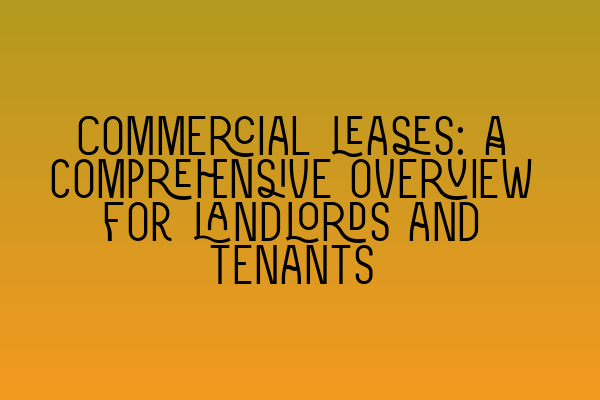Commercial Leases: A Comprehensive Overview for Landlords and Tenants
Welcome to SQE Property Law & Land Law Blog! In this post, we will provide you with a comprehensive overview of commercial leases, covering everything both landlords and tenants need to know. Whether you are new to the world of commercial leases or looking to brush up on your knowledge, this guide will serve as a valuable resource.
Understanding Commercial Leases
Before we delve into the details, let’s start with a brief introduction to commercial leases. A commercial lease is a legally binding contract between a landlord and a tenant for the rental of a commercial property. Commercial leases differ from residential leases in terms of their purpose, length, and specific provisions.
Now, let’s dive deeper into the key aspects of commercial leases:
1. Lease Terms and Duration
The lease terms and duration are essential aspects of any commercial lease agreement. They outline the specific conditions under which the tenant occupies the property and the length of the lease. Lease terms typically range from three to ten years, but can vary depending on the specific needs of the parties involved.
During the lease negotiation process, both landlords and tenants should carefully consider the duration of the lease. For tenants, a longer lease term may provide stability and prevent potential rent increases. On the other hand, landlords might prefer shorter lease terms for flexibility and the opportunity to renegotiate rents more frequently.
If you need assistance with lease negotiation or have questions about lease terms and duration, our expert team at SQE Property Law & Land Law can provide tailored advice to suit your needs.
2. Rent and Rent Review
The rent is a crucial element of any commercial lease. It is the monetary consideration paid by the tenant to the landlord in exchange for the use and occupation of the property. Rent can be fixed, stepped, or subject to periodic reviews.
Rent review clauses are included in commercial leases to ensure that the rent reflects the current market value of the property. Rent reviews can occur periodically, typically every three to five years, or at specific intervals specified in the lease.
Our team of legal experts at SQE Property Law & Land Law can assist both landlords and tenants in negotiating fair rent amounts and reviewing rent clauses. Contact us today for personalized advice.
3. Repair and Maintenance Obligations
Commercial leases stipulate the responsibilities for repair and maintenance of the property. These obligations can vary depending on the type of lease, whether it is a full repairing and insuring lease, an internal repairing lease, or a lease with limited repair obligations.
Understanding your repair and maintenance obligations is crucial to avoid disputes and ensure the property remains in good condition throughout the lease term. Our team can guide you through the complexities of repair and maintenance provisions to ensure clarity and fairness for all parties involved.
4. Break Clauses
Break clauses allow either the landlord or the tenant to terminate the lease before the agreed end date, typically at specific intervals. Break clauses can be unconditional, requiring only notice from the party intending to end the lease, or conditional on certain conditions being met.
If you are considering including a break clause in your commercial lease, it is vital to carefully consider the conditions and requirements for exercising the break. Our team can provide expert advice on break clauses and help you navigate the intricacies of termination options.
5. Subletting and Assignment
Commercial leases often include provisions regarding subletting and assignment. Subletting allows the tenant to lease part or all of the property to a third party, whereas assignment involves the transfer of the lease to another party.
Understanding the rights and restrictions associated with subletting and assignment is crucial for both landlords and tenants. Our team can guide you through the process and ensure compliance with legal requirements.
6. Landlord’s Consent and Alterations
When a tenant wishes to make alterations or modifications to the commercial property, they generally require the landlord’s consent. The lease will outline the conditions for obtaining consent and provide guidance on the scope and nature of permitted alterations.
If you are a landlord seeking to maintain control over potential changes to your property or a tenant needing permission to carry out alterations, our team can provide you with the necessary guidance and legal expertise.
Conclusion
Commercial leases are complex legal documents that require careful consideration from both landlords and tenants. Understanding the various elements outlined in this comprehensive overview is essential for negotiations, long-term success, and avoiding disputes.
If you require assistance with any aspect of commercial leasing, from negotiations to reviewing or drafting lease agreements, our expert team at SQE Property Law & Land Law is here to help. Contact us today to schedule a consultation and ensure that your interests are protected.
Related Articles:
